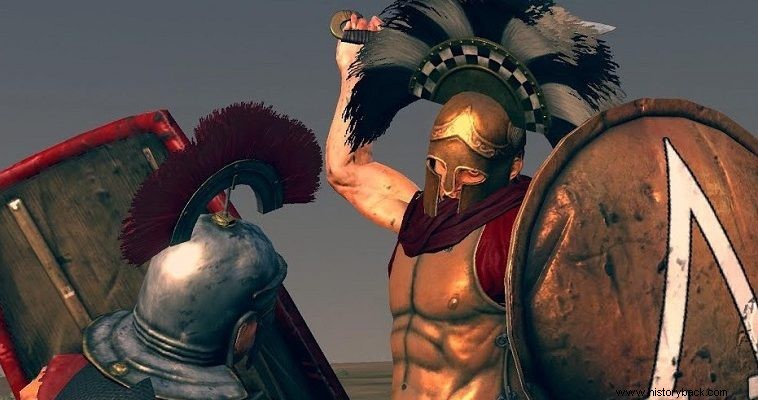
The proud Sparta was for centuries the most warlike Greek city with the best soldiers of Greece. The historic city had declined dramatically after the defeat of the reformer king Cleomenes at Sellasia in 222 BC. Despite this, she could still show her teeth even against mighty Rome.
In 207 BC Sparta was defeated by the Achaean League. The tyrant of Mahanida was slain. Mahanidas was succeeded by Pelopas, who was dethroned by Navidas who claimed royal descent.
Navis soon came into conflict with the Achaean Commonwealth and was defeated. During the Second Macedonian War Navis allied with Philip V of Macedonia who was fighting the Romans and winning Argos. But when he saw that the Romans were winning, he sided with them. The Romans validated the Spartan occupation of Argos.
However, they soon regretted both because of the pressure from their ally the Achaean Commonwealth, and because Navis began to strengthen Sparta, creating a fleet. He even fortified Gythio, which he turned into a main naval station.
At the same time, he freed many Helots whom he included in his army, granting them lots of land, along with mercenaries. Spartan citizens and the now free helots were armed as sarissaphoros.
War
In 195 BC the Roman emperor Titus Flaminius, with the agreement of most of his Greek allies, declared war on Sparta. Flaminius sent an embassy to Sparta demanding the "liberation" of Argos, which Rome, however, had conceded to the Spartans. After the refusal of Navidus, 50,000 Romans and their Greek allies marched against him.
The allies bypassed Spartan-controlled Argos and moved towards Laconia. Navis had about 15,000 men. In Sellasia he even attacked the Romans and their allies by surprise, winning a small, temporary victory. He was forced to retreat due to the numerical superiority of his opponents.
A new conflict occurred shortly before the arrival of the Romans in Sparta with the mercenaries of Navidus again surprising the enemy and causing him losses , but in the end being forced to retreat, this time within the walls of Sparta.
After capturing Amykles, the Romans moved against Gytheios. The city's garrison, under Dexagoridas and Gorgopas, resisted bravely. Faced with the overwhelming superiority of the enemy, however, Dexagoridas wanted to capitulate but was killed by Gorgopas who continued the resistance.
Despite his courage and fanaticism, Gorgopas was finally forced to capitulate on the condition that he go free with his men. At the same time the Argive Pythagoras hastened with 3,000 men to reinforce Navidas. The latter tried to capitulate with the Romans by giving Argos.
But Flaminius did not accept and imposed unacceptable conditions. After the talks failed the Romans surrounded Sparta.
The indomitable Spartans
Flaminius did not want to proceed with a regular siege of the heroic city. Instead, he decided to take her out on the spot. The Romans and their allies did attack and after a fierce wall fight they captured part of the wall and entered the city. However, their progress inside was slow due to the narrow streets.
Gradually, due to their superiority in men, the Romans pushed the Spartans further and further into the center of the city. But Pythagoras encouraged the Spartans and even set fire to the buildings that were near the walls, creating a fiery barrier against the Romans. The latter were bewildered and with heavy casualties retreated out of the city, learning a lesson in Spartan stubbornness.
The Romans made another general raid. The Spartans, with a spirit of defense, held Pythagoras, however, fighting desperately for three days. But Navis understood that in the end the enemies would prevail and demanded capitulation.
Delivery
The terms were harsh. Sparta would hand over Argos and all the other Laconian cities it held, along with its fleet and pay a war indemnity to Rome. He also had to cancel the social reforms in which he had progressed.
However, the Romans, faithful to the doctrine of "Divide and rule", did not dethrone Navidas whom they wanted as a counterweight to their ally, supposedly, the Achaean Commonwealth.
The Romans literally played with the Greeks, turning one against the other, taking advantage of the endemic discord. Flaminius from Nemea, where the feast of the same name was celebrated, proclaimed the "independence" of the Greek cities in a climate of general excitement among the foolish Greeks...
